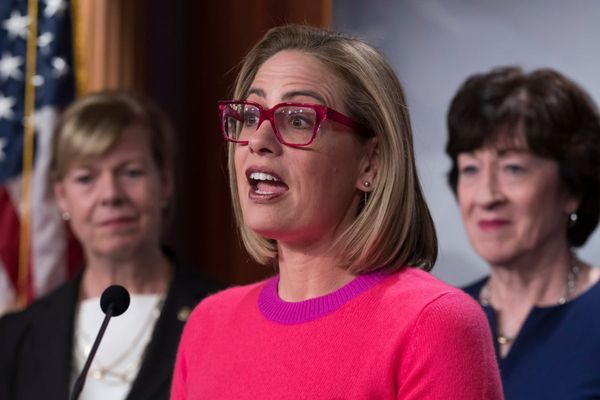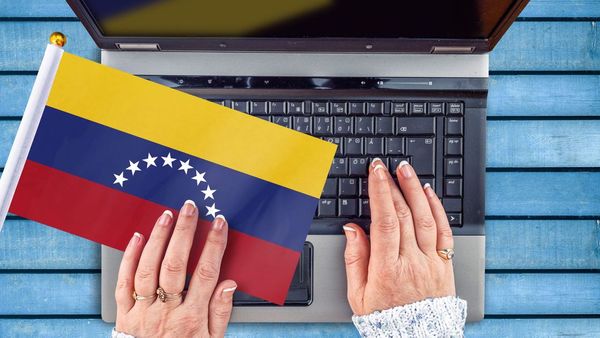
In a neon-lit bandroom in Melbourne’s inner’s north, singer-songwriter Gordi is stationed behind the merchandise table.
Punters are beginning to pile into Thornbury’s Shotkickers for the final gig of a special series showcasing young Australian musicians, curated by Gordi and fellow musician Alex Lahey to boost fanbases for emerging artists.
Gordi says a recent Triple J survey – which found almost half of Australian artists had considered quitting in the past year partly due to a lack of performance opportunities – spurred her into action.
“It was a reason for us to say, ‘let’s give them some’,” she says.
“We were hearing from our friends how hard it was to sell tickets and get a vibe going as an artist, and break through the market.”
The gig residency guaranteed a fee for the artists and sold band merchandise on their behalf for free to ensure they are not running at a loss.

Noah Harris, the frontman of indie-rock band Harris, which played at the series’ final show, says he has watched musician friends aged in their mid-20s and 30s let go of their dreams of playing music professionally since Covid.
“A lot of people quit and [they] found it too hard,” he says. “It’s a constant thing on your mind. It’s just such a hectic industry.”
It is a sentiment echoed by live music operators who say they fear more venues will go under in 2024, as the impacts of the pandemic linger.
Footscray’s Hotel Westwood – previously the Reverence Hotel, a beloved destination for indie, punk and metal music that closed in 2019 – was listed for sale earlier this year. The venue is yet to secure a new tenant, with co-owner James Young – who also owns Melbourne’s iconic Cherry Bar – saying he ran out of money during the pandemic.
At the site of Fitzroy’s beloved Punters Club, which closed in 2002 after being a launch pad for bands like Magic Dirt in the late 1980s and 90s, sits Kewpie – a restaurant owned by hospitality group Australian Venue Co, which is being sold to a Hong Kong investor. CBD dive bar and bandroom the Liberty Social closed in 2015, and the venue now houses the polished cocktail bar the Mill House.
‘We can’t afford everything’
Hospitality venues facing rising wages, food and energy costs are increasingly turning to more gourmet meals and increased prices to stay afloat.
Shane Hilton, co-owner of the Last Chance Rock & Roll Bar – who also led a campaign to save the Tote in Collingwood – says the popularity of food-focused pubs represents the financial challenges faced by the industry.
“It’s cheaper and easier to run a gastropub than it is to run a live music venue,” he says.
“The associated cost with live music is a lot – you’re upgrading the gear, we have to pay band bookers and PR people.”
Apra Amcos, Australia’s music rights collecting agency, found more than 1,300 live music venues and stages were lost since Covid began.
The figures, released in October, measured the reduction in venues who held a live music licence with the agency post the pandemic. The live music scene for small to medium gigs shrank by a third over the past three years, while Victoria saw a 24% reduction in venues.
Sasha Janssen, the operator of Brunswick East venue Whole Lotta Love, is preparing to close next year after being on a month-by-month lease.
“It’s heartbreaking,” Janssen says. “I have worked 80-plus hour weeks, shed blood, sweat and tears, fought with everything I have to keep the venue going for the last seven-and-a-half years.
“People still want to see live music, bands still want to play, and venues still want to put it on but to be able to make it viable we have to put up our prices, which makes it harder for audiences to come and see as many shows as they would like.”

Hilton says the public liability insurance premium at the Last Chance was $12,000 a year pre-Covid. It is now $50,000. He points to state-run insurance for live music and cultural venues as a priority reform.
“These are things pushing live music venues literally to the edge of having to shut up shop because we can’t afford everything,” he says.
“There’s not a lot of money to be made out of live music.”
Paris Martine, who works as an independent booker for the John Curtin Hotel in Carlton and Howler in Brunswick, predicts venue owners will leave the industry in droves.
“This government is at risk of converting the world’s most livable and live city into a cultural wasteland,” she says. “Liquor licensing fees are up, encroaching developments are going up, noise complaints are up, there’s a new tax on beer cans, land tax is up and insurance has skyrocketed. The margins are harder to make work.
“We still haven’t seen the full impact of the post-pandemic state land tax increases yet as many businesses are still in an existing lease term that may only come up for renewal every four, five years.”
Martine says the John Curtin Hotel, a cornerstone of Melbourne’s music scene which narrowly escaped closure last year after a fierce union-backed campaign, will face the same risks when its 10-year lease ends.
The operators of the historic pub signed a new lease with its owners after it was sold to an offshore investor last year.
“The heritage we have received is amazing and means the downstairs bar remains, but you can still add a bunch of apartments where the band room is and change its use and vibe forever,” she says.
‘Just go out and support the band’
Amcos has called for a tax offset for venues to incentivise them to continue to host live music and revitalise the industry.
The offsets could operate on a similar system to those in the local screen industry, where rebates are claimable if productions meet local content and employment quotas. It is also lobbying state and territory governments for the establishment of special entertainment precincts to foster and protect new and existing live music venues.

There is about one live music venue for every 8,915 people in Melbourne, according to state government estimates.
“Melbourne is not only Australia’s live music capital but the world’s – we have more music venues per person than Berlin, New York, London and Austin, Texas,” a Victorian government spokesperson says, adding it has committed $34m to support the industry recover from the pandemic.
Hilton’s message to music fans is simple – “vote with your feet”.
“Just go out and support the band, buy their merchandise and their records in physical format,” he says.
“Go to a free gig. Go watch a band you don’t know, listen to your local community radio as they support independent musicians. It has a flow-on effect of bringing money into live music venues.”
Hilton is hopeful for the future after he and his partner raised $3m via a crowdfunding campaign to save the Tote from potentially being sold to a developer. “Everyone thought it was impossible,” he says.
In a historic first for live music in Australia, the new owners have placed the building in a trust, to ensure it stays as a venue for future generations, while they operate the business.
“Being able to turn the tide around and make the best that it can be should be a bit simpler,” Hilton says.
“Being able to walk in on Saturday or Sunday afternoon and have bands in the front bar or have bands in a sold-out room, it’s the best feeling in the world. So are we optimistic for the future.”







